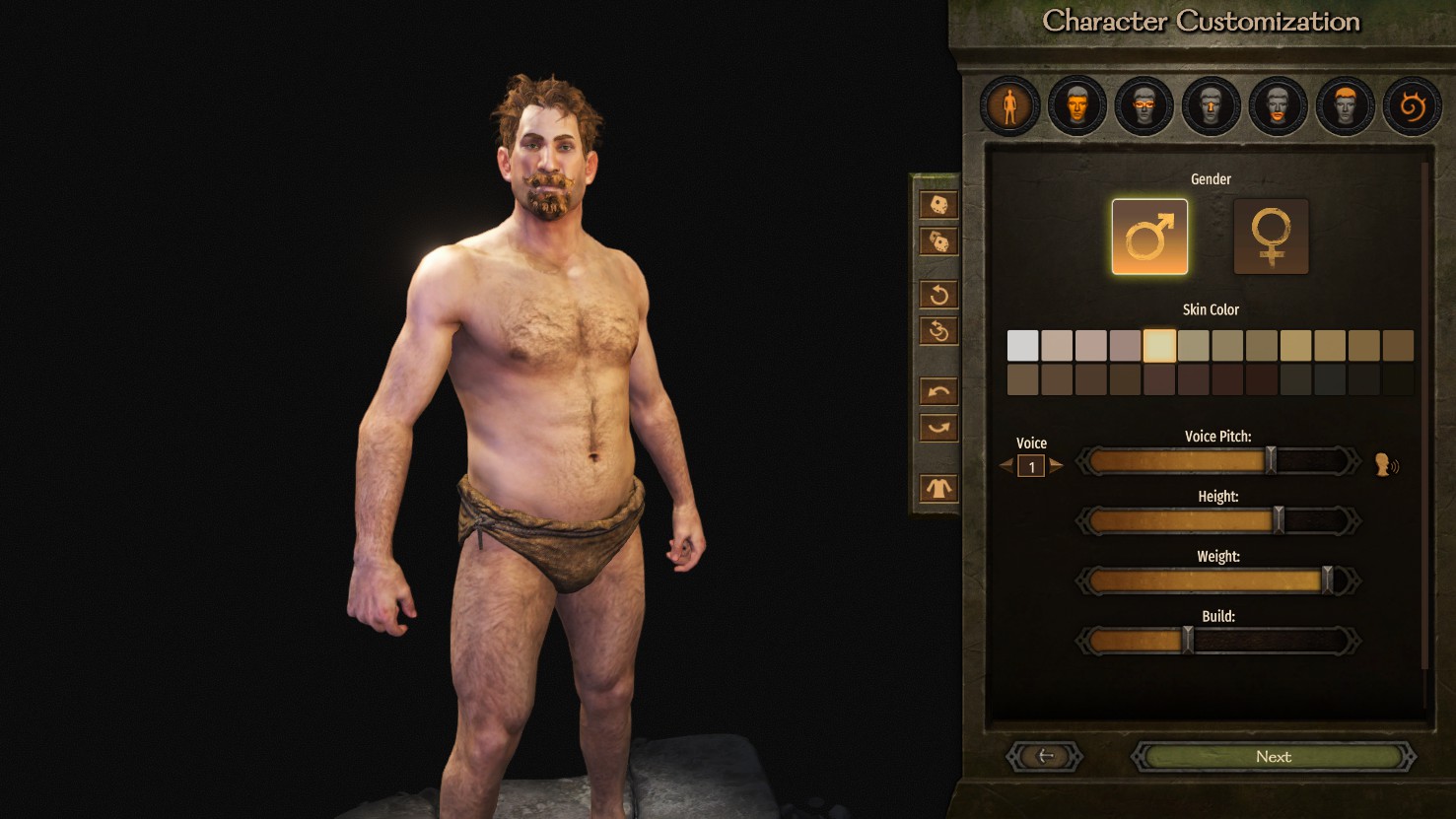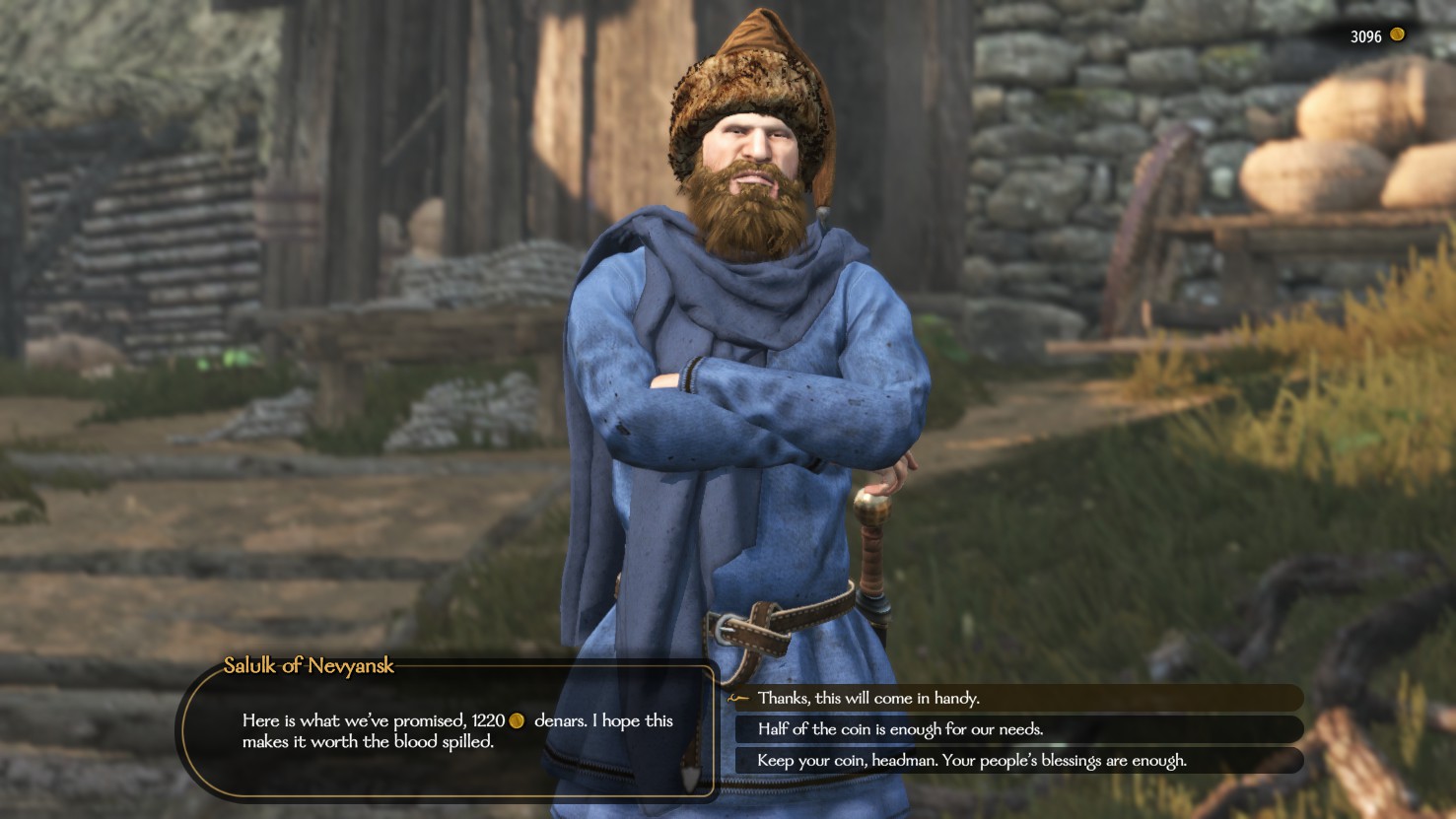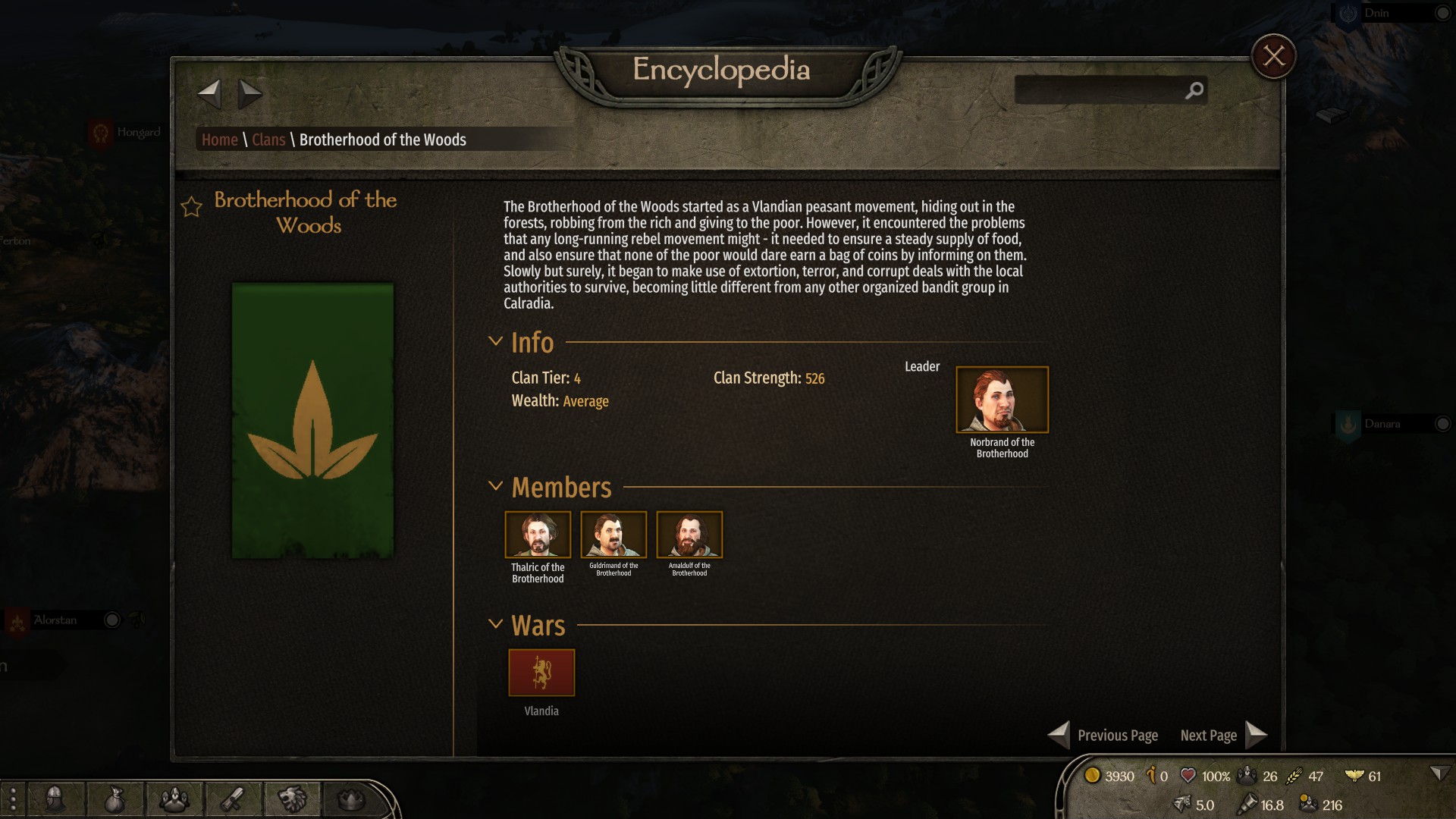Robbing from the rich in Mount & Blade 2: Bannerlord
There's an ancient, established tradition of folk tales featuring outlaw heroes. In Britain we have Hereward the Wake and Robin Hood. The US has Davy Crockett and Wyatt Earp. And in China there's an entire genre of writing, called Youxia (literally 'wandering vigilante'), devoted to tales about men who travel the land writing wrongs and protecting the weak. But is it possible to live this way in Mount & Blade 2? To eschew the feudal trappings of land and power in favour of a life spent living on the road, fighting injustice? Yes. To roam the forests, waiting to strike out against the rich, lazy, and powerful? Also yes, but to a lesser extent. And only after a lot of preparation.
The first part of our journey begins with the birth of our hero. Bannerlord's character creation offers a neat twist on the number crunching of standard RPGS. Instead of building a hero, I create a backstory. The first step is choosing your homeland. I pick Battania, a clan-based culture from the heavily-forested northwest corner of the map. I feel like I'll be spending a significant amount of time chasing bandits—or, equally likely, fleeing lordly retribution—so the woodland terrain buffs the faction provides might prove useful. When things get spicy I can leg it back to the nearest thicket.
I spend some time tinkering with my hero, trying to craft an inspiring leader, but, honestly, it feels forced. This is a folk tale. I should put my faith in destiny. What right have I—a soft, human man, sitting at a PC—to create a leader who will change the fate of entire continents? I decide true heroes aren't designed; they're auto-generated. I give myself three rolls of the randomisation dice. The first one resembles a racist sausage roll; the second is so boring I can't even remember him. It's my last roll. I have to stick with the result, whatever happens. The die is cast, and apparently I'll be playing as a husky car park attendant from a Robin Hood-themed family attraction. I'm not sure I'd follow him to the ticket machine, let alone battle, but the fates have chosen.
Pennant agreement

My hero's origin story determines his skill set. As an Englishman, the idea of outlaws is inextricably linked to bows, so I lean towards choices that will improve his ranged fighting. I buff his riding skills, too, since I expect he'll be running away a lot. I also need a banner. I want an image that will strike terror into the hearts of evildoers. Something that says 'justice, tempered with mercy'. Instead, I get distracted mid-creation and choose a smiley pink fish on a teal background. I feel like the ignominy of being defeated by a leader whose pennant resembles the sign for a gentrified chippie will be an additional punishment. The final choice is his name. The game suggests Mengus, a title that sounds like a Greek word for the divot above your bumhole, and who am I to argue? Mengus Cromm rides, the world trembles.
Actually, the world will have to wait. Because while Mengus Cromm is indeed riding, he's riding alone. Bannerlord starts me off with enough money to recruit a decent-sized stack of soldiers, but I feel some reluctance to surround myself with mercenary warriors. Instead, I recruit a small band and spend some time bothering outlaws to hone their skills. If I'm honest, this doesn't feel magnificently heroic. It's like I'm learning to cage fight by kicking homeless people while they sleep. But Mengus of Clan Cromm has a higher purpose, and his army needs the practice. And anyway, if they didn't want to be chased across the map by heroes they shouldn't have called themselves looters.
Clan party
I win a few battles and realise I need to refine my self-imposed rules to really get a sense of who Mengus is. First of all: Mengus doesn't take prisoners. At least, he doesn't unless they're worth something. I realise this reads like he murders everyone he captures, but this isn't the case. Captives are released because dragging them around the map slows me down. My one concession is that I decide to recruit my first captive, almost like I'm pinning a piece of my child's artwork to the fridge. His ascension through my merry band's ranks will be a reminder of my humble origins and of Mengus' legendary benevolence.
When my troops start to level up, I decide to focus on ranged combat. There are a few reasons for this. Firstly, it feels more outlaw-y. Secondly, I'm a stinking coward. Years of playing Total War as Dwarfs and the English have left me obsessed with the idea of thinning the enemy's ranks long before they reach my line. If the battle ends without anyone having to swing a sword, even better. Unfortunately, I feel like Mengus himself is the weakest link in my otherwise flawless battle plan. When I'm not shooting my own men in the arse I'm sending arrows harmlessly sailing above enemy heads. My new, less-heroic plan is to wait until my troops engage, find a nice safe flank and fire arrows into the fleshiest part of the enemy line. Hopefully they leave that bit out of the folk songs.
Grain and thunder

It's around now that I make some decisions about the type of work Mengus does. He's not a base mercenary. He only takes jobs that are morally enriching. Protecting desperate villagers from roaming brigands is okay; delivering sheep for a merchant is not. Accepting these quests from village leaders means that I've got enough coin to upgrade my outlaw band, buy horses, and stockpile provisions. This also leads me to another decision about my clan: I want them to be deliciously plump. Mengus, apparently, loves to feast. I make sure we've always got grain, fish, butter, olives and beer. We might live like vagabonds, but we eat like lords.
I spend the next few days taking honourable quests and chasing bandits around the map like a terrier after a squirrel. Merchants thank me for keeping the roads safe when I visit the towns. Perhaps not the intention of my noble deeds, but a useful byproduct nonetheless. Not all my quests are successful, though. I agree to train some troops for an imperilled village, but my archers are now so good that my new recruits barely get the chance to connect pitchfork to bandit flesh. It takes weeks for them to level up, and by the time I send them back I feel like I'm returning a broken kettle outside of the warranty period.
I also get swayed by a classic 'rescue my daughter' quest—Mengus is a sucker for a damsel in distress—but it turns out that she was just fleeing from her overbearing father, Haretheos of Tarcutis. I decide to do the noble thing: I let her escape to live with her new husband, while I run away from any consequences and flee to a different province. I wasn't planning on going back to Tarcutis anyway.
There is turmoil on the horizon, though. Sexy turmoil, in a heavy mail coif.
It's around now that I find myself in a difficult position. My merry band is small but well-trained. Strong enough to handle most bandit gangs, but still too weak to attack the fat, content merchant caravans that waddle across the land. So, in order to gather enough coin to grow my forces, I make an industry out of looting the looters. I spend days harvesting criminals and selling their gear to towns and villages. If I can double this up with quests to hunt down bandits, even better. Mengus is all about efficiency. After weeks of chaos, fighting, and feasting, I have enough gold to amass a small but dangerous force. I buy stacks of horses to increase my speed—so I can chase down even more bandits—and I start to feel good about my place in the world.
There is turmoil on the horizon, though. Sexy turmoil, in a heavy mail coif. I meet the woman who might one day become the love of Mengus' life. For reasons beyond my understanding, Megenhelda of the Dey Tihr intervenes in a fight against a hilariously small group of bandits, bringing her eighty-three strong army to a battle against five robbers. It's brutal. I can barely see where the enemy is amid all the allied troops. And, apparently, nothing enflames Mengus' ardour like a vulgar display of martial power. He is smitten. More importantly, this proximity gives Mengus an opportunity to try his legendary charm on a member of the aristocracy. If a lowborn hero romancing a rich lady isn't the stuff of folk legend, I don't know what is. We talk about all the stuff Megenhelda is into: generosity, mercy, valour and a cheeky bit of roguery. The most astounding thing about all of this is that it goes alarmingly well. We promise to meet again.
Forest in peace

One of the many cool things about Bannerlord's intricate, reactive world is that I can look up Megenhelda in the game's encyclopaedia—essentially like creeping on her Instagram—and find out who her friends and enemies are. A secondary plan, then, begins to form. I'll find out who she hates the most and build an army big enough to bother them. Or, more accurately, find out who her weakest enemy is and snap at their heels like an aggressive dog. It turns out that she has a grudge against a minor faction called the Brotherhood of the Woods. They're like a dark mirror of my very own warband: a group who started off robbing the rich to give to the poor before turning to robbery, violence, and extortion. They're significantly more powerful than me, but if I can gnaw away at their forces then Megenhelda might notice me.
The lady Mengus fancies is mildly impressed by my heroism.
I manage to find one of the leaders of the Brotherhood armies, isolated and alone. But it's risky. Their force is over twice the size of mine—59 soldiers to my measly 26. But the good news is that they're poorly trained, not as well fed, and, unlike me, their captain isn't invigorated by his love for a wealthy stranger. I take the high ground, line up my troops, and let Guldrimand of the Brotherhood come to me.
It's a massacre. Guldrimand falls before he reaches my line and my ranged troops annihilate his forces. My infantry barely has time to engage. My mighty pony falls during the battle, but I escape otherwise unscathed. I earn my first big victory, killing or injuring all of their army and only losing one soldier myself. It's a victory that earns me a fat slab of renown as well as a serious morale boost to my army. I capture Guldrimand, who I can ransom for a meaty 1,000 gold.
The most important thing, however, is that the surrounding towns and villages are safer now, and that the lady Mengus slightly fancies is mildly impressed by my heroism. There's a grim irony in the first wealthy lord I ransom being a heroic outlaw who went rotten, but it's a lesson that Mengus of Clan Cromm won't soon forget. You die a hero, or live long enough to get captured by a horny Battanian peasant eager to impress a woman he's only met once. Sit the fuck down, Ivanhoe. There's a new folk hero in town.

Post a Comment